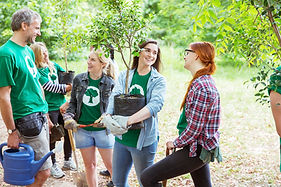
Project
SEgoesGreen
The role of SE in addressing climate change is increasingly recognized. According to the SE Action Plan, Social Economy Entities (SEEs) have the proven capacity to reshape our future and lead to a green and more inclusive transformation (EC 2021). Some 2.8 million SEEs are working everyday in Europe towards offering innovative solutions to key social and environmental challenges and by doing so, contribute to changing behaviors towards climate mitigation. To this end, SEEs use a wide range of transdisciplinary and sustainable approaches and tools that are aligned with the needs of the local communities (New European Bauhaus, 2021). Indeed, SEEs are considered as integrators of circular value chains and partnerships among local actors and facilitate their collaboration towards the upscale of green practices and business models especially in the fields of circular economy, organic agriculture, renewable energy, housing and mobility (EC, 2022). Yet, while the SE has indisputable assets to accelerate the Green Transition, this potential still remains under-exploited (EC, 2021). SEEs report a great need for training and knowledge on how to identify and adopt greener practices and on the other hand, meaningful education for addressing climate change is still far from being a core curriculum component in SE university curricula. SEgoesGreen aims at supporting Social Economy (SE) university faculties to integrate teaching on sustainability within their courses by exploiting the educational potential of Nature Based Solutions (NBS). To this end, the project aims to offer flexible training tools and resources for SE educators and equip them with competences for integrating innovative pedagogies powered by NBS so as to fully exploit the transformative potential of Social Economy for a green transition.


Objectives
Our project sets the following objectives:
• To develop new knowledge for integrating NBS in SE related HEIs by offering a comprehensive study combining state of the art in NBS education and eco-citizenship while exploring SE HEIs contextual factors that influence the integration of NBS in their programmes that will serve as a reference point for understanding the use and educational value of NBS.
• To train SE university teachers and provide them with teaching and learning materials that will support them in teaching action-oriented environmental education based on NBS and eco-citizenship.
• To promote SE students’ interest in green practices and empower them to join the fight against climate change by offering a future-oriented curriculum that will equip students with the necessary eco-citizenship skills and knowledge for implementing NBS.
• To demonstrate the educational potential of NBS within the SE sector and further promote the integration of NBS as a standard component in SE courses through the development, testing and assessment of a high replicable educational programme.
Impact
The project is expected to have a strong impact on the main beneficiaries:
1. SE educators will develop their understanding, increase their confidence and skills to integrate innovative sustainability education powered by NBS in their courses.
2. Students in SE studies will develop better awareness about environmental challenges and NBS potential contribution; build skills to take action to drive sustainable change by harnessing NBS; and foster behavioural transformation towards eco-citizenship. At the same time, they will first-hand realise the connection and contribution of SE to drive the green transition.
3. Education researchers and policy makers will be reached through evidence-based data and recommendations to drive future policy and practice developments for integrating NBS in SE faculties.
4. Environmental Scientists and NBS experts will realise an additional dimension of NBS through the SE, create new interdisciplinary networks and partnerships.
5. SE actors will increase their awareness about the benefits of NBS and in the long term, contribute to a greener society and a greener economy driven by a well-equipped young work driving the social economy.

